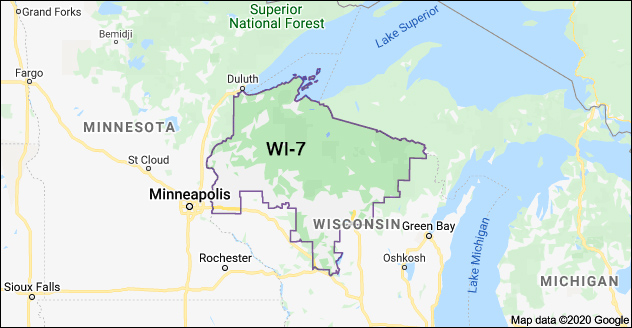By Jim Ellis — August 17, 2022
Primary Results

Former state Rep. Mary Peltola (D) is leading the Alaska special election race to fill the state’s at-large congressional district.
Former governor and vice presidential nominee Sarah Palin (R) holds a 5,266 vote lead over Nick Begich III (R) for the all-important second place position. Under Alaska’s new voting procedure, ballots postmarked yesterday have until Aug. 31 to reach the county clerk’s office and be tabulated. The extra time is important for the outlying rural areas to be included.
Second position is so important because the third-place finisher in this electoral situation, at this point that being Begich, will be eliminated and the Ranked Choice Voting process will begin. If Begich is eliminated, the ballots listing him as the first choice will be found and the second choice votes from only these ballots will be added to the process. The eventual winner will immediately be sworn into the House. All three of the aforementioned candidates also advanced into the regular general election.
Turning to the US Senate race, incumbent Sen. Lisa Murkowski (R), running for a fourth full term, is first at this point in the counting process with 43.7 percent of the vote among 19 jungle primary candidates, and just ahead of former Alaska Director of Administration Kelly Tshibaka (R), who former President Trump long ago endorsed. Tshibaka’s current vote percentage is 40.4. It appears Democrat Patricia Chesbro (6.2 percent) is well-positioned to take a distant third place; vying for the fourth and final position are Republicans Buzz Kelley and Pat Nolin.In the governor’s race, incumbent Mike Dunleavy (R) looks to have secured first position with 41.7 percent of the jungle primary vote among 10 candidates. Also clinching general election ballot slots are former state Rep. Les Gara (D) with 22.0 percent of the vote, and ex-Gov. Bill Walker (I) who so far has posted a close 21.9 percent. The final general election qualifying position appears undecided between two Republicans, Charlie Pierce and Christopher Kurka.
Wyoming: As Expected, Rep. Cheney Loses Big — Early in the counting process, it was clear that At-Large Wyoming Rep. Liz Cheney (R-Wilson/Jackson) would lose her US House seat to attorney Harriet Hageman, the candidate former President Donald Trump supported early.The vote count was a landslide in favor of Hageman — 66-29 percent — who ran a measured campaign. Her theme was concentrating on serving the constituency while highlighting that Rep. Cheney used the position to fulfill her own political goals.
Incumbent Sen. Cheney carried only her home county of Teton, which houses the cities of Jackson and Jackson Hole, and southeastern Albany County; Hagman topped the vote totals in the state’s other 21 counties. Republican turnout overwhelmed that of the Democrats, 170,409 to just 7,233 ballots cast, suggesting that a large number of the latter party’s members did what Cheney asked them to do and crossed over to vote for her in the Republican primary.
The GOP turnout was up 58.7 percent compared to 2020, while Democratic participation was down 30.7 percent, providing more evidence that a significant number of Democrats voted in the Republican primary. Two years ago, Cheney won a contested Republican primary with 73.5 percent of the vote, and scored a 68.6 percent win in the general election.
Hageman will now face the new Democratic nominee, Native American community activist Lynette Grey Bull, the 2020 party standard bearer against Cheney. Hageman now becomes the prohibitive favorite to win the general election.
Senate
New Hampshire: Candidate Staked to Big Lead — St. Anselm’s College released the results of their quarterly poll of Granite State voters, this one taken a month before the state’s late primary election. This New Hampshire sampling universe (Aug. 9-11; 1,898 registered New Hamshire voters; 900 likely New Hampshire Republican primary voters; live interview), as have those from two other St. Anselm’s 2022 polls, sees President Biden with an upside-down job approval rating. Biden registers 42:57 percent favorable to unfavorable status.
Republicans hold a three-point lead on the generic party vote questions, and 68 percent of the respondents believe the country is on the wrong track versus just 21 percent who believe America is headed in the right direction. Democrats have a clear advantage on the abortion issue by a 49-23 percent margin.
In the Senate GOP primary, retired general and 2020 Senate candidate Don Bolduc holds a significant 32-16-4-4 percent advantage over state Senate President Chuck Morse (R-Salem), former Londonderry Town Manager Kevin Smith, and investor Bruce Fenton, respectively.
House
NH-1: 2020 Nominee Mowers Leading in New Poll — The co/efficient survey research firm tested the upcoming Sept. 13 Republican congressional field in the state’s swing 1st District. New Hampshire’s eastern CD has defeated more incumbents than any seat in the country since the 2004 election.
In the Republican primary where candidates hope to challenge Rep. Chris Pappas (D-Manchester) in the general election, the survey (Aug. 13-14; 829 likely NH-1 Republican primary voters; live interview & text) projects 2020 nominee Matt Mowers to be leading the field with 31 percent support. Former Trump White House media aide Karoline Leavitt 16 percent, state Rep. Tim Baxter (R-Portsmouth) nine percent, and former news reporter and wife of ex-Massachusetts Sen. Scott Brown (R), Gail Huff Brown, at eight percent preference. This district electorate will once again witness a highly competitive general election.







